- Bernard Preston homepage
- Yellows
- Organic Butternut
Organic butternut
Organic butternut, grown in a compost-heap produces amazing fruit. I have known for years that plenty of humus makes for nutritious vegetables but this year it was brought home spectacularly.
In fact it creates quite a problem because the winter squash totally took over ownership of the compost heap. To the extent that we are unable to use the humus in the beds for where it was destined; the dark-green leafy veggies like kale, spinach and broccoli.
So be it; we have other compost piles that can be raided for the winter-garden. In fact we now retain one heap specifically for the butternut.
Moving the compost to the beds before they become sodden in the rainy season makes life a lot easier; for us it is a late winter chore[4].
This page was last reviewed on 9th March, 2024.
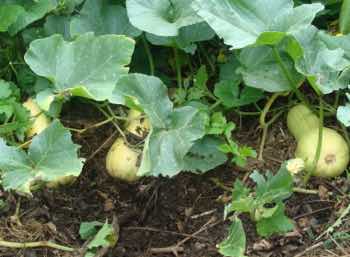
In our attempts to regularly enjoy eight to ten coloured fruit and vegetables each and every day, we had to diversify our meals away from a boring cereal for breakfast and sandwiches for lunch; and meat and potatoes for dinner.
Well I am exaggerating, of course but there are an awful lot of folk still on the black and white diet; with perhaps a leaf of iceberg lettuce and a tomato thrown in.
That meant looking for yellow, green and purple foods; red too. I used the word enjoy in the last paragraph. I wanted to include the nine colours which are proved to lower the all-cause of death by thirty five percent but it still had to be delicious; that was primary.
Or is it? Do we only have to eat food that tastes delicious and slides gloriously down the throat? It took me a long time to realise that was a grave error; some vegetables like kale are never delectable. We choose them because they give us protection against serious diseases.
Yellow and orange foods are filled with substances called beta-carotenes, the precursors of vitamin A. They give our meals a fantastic flavour but more important, they keep the dreaded tumours at bay; and protect our children from blindness, measles and diabetes.
I have watched one parent and many patients die from the Big C and we are determined to do it differently. It is a horrible disease and whilst much is unknown, there is an awful lot that has been researched. Enter the anti-oxidants found primarily in our coloured vegetables and fruit.
Make sure you do not suffer from a beta carotene deficiency. It's also a primary cause of blindness in children.
Beta-carotene
Beta carotene is one of the many coloured phytochemicals that keep malignant tumours at bay. Do you want to avoid the big C enough to ring in some dietary changes? Try to enjoy ten brightly-colored foods every day; this organic butternut will go a long way to keeping you in this important precursor of vitamin A.
Surprisingly taken in supplement
form, it actually increases your chance of getting a tumour; let your food
be your medicine and keep your pills to a minimum.
Gardening is a strange business. One year it's the organic butternuts that do fantastically well, next season it is the sweet potatoes, beans or corn; there are subtle variations in weather, the seed and other unknowns that cause these conundrums.
2021 was the butternut year; over 150 fruit, many of them massive in an ordinary suburban garden.
Well the peas are looking fantastic this year too but the pole beans have been a big disappointment in the past. The Mexican bean-beetles got into them, every pod looking like it had measles. A new venture in 2016 solved the problem; free range hens.
These giant butternut chose to grow uninvited in the compost-pile, seed from the kitchen refuse and gosh they were impressive. The biggest of them weighed nine and half pounds and was 43cm long.
We only grow organic vegetables, so some were planted into Mother Earth, perhaps with a half a spadeful of compost but no more. We had a great crop of them, but just look at the difference.
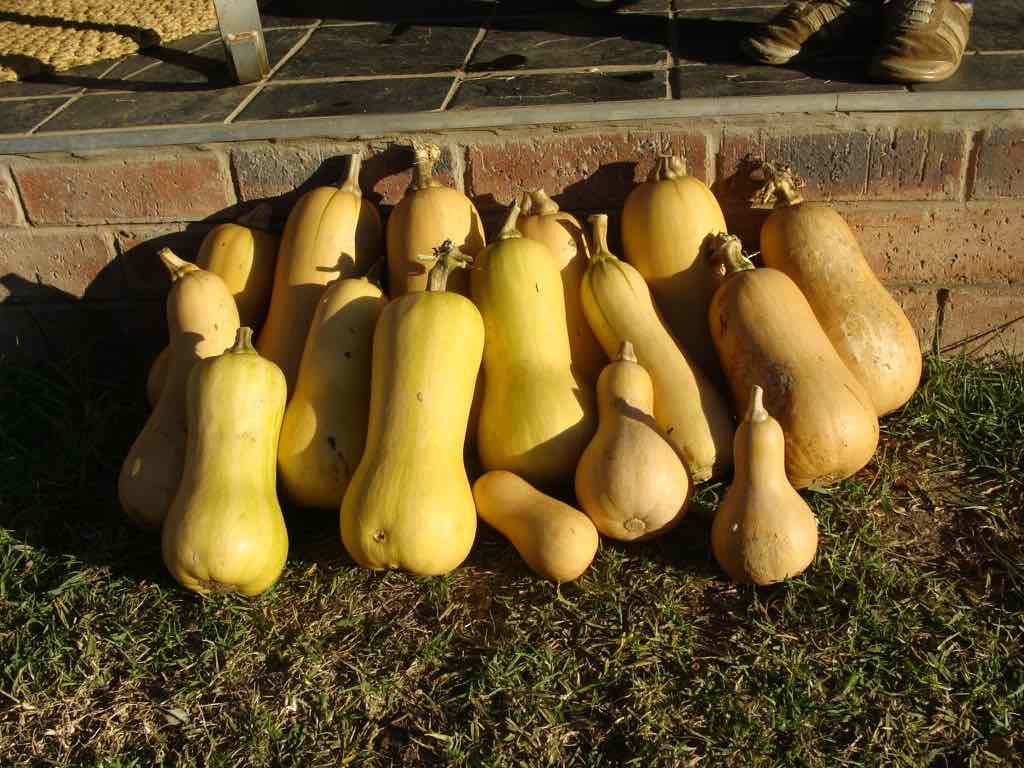
Both of those below are fantastically good but no prizes for guessing which grew in the compost heap. And the flavour was not diluted simply because of its giant size.
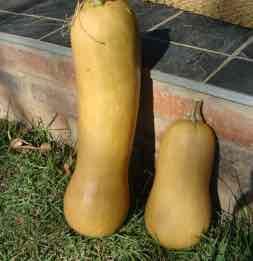
Organic butternut
Organic butternut need a mound of compost and the plants will follow you in the kitchen door if you are not careful.
The smaller ones too are organic butternut but grown with little or no added humus. There is nothing wrong with them; they are certainly as good as you will get from the supermarket. But the average length is 20cm, with a weight of three pounds, compared to the giants.
We are going to have some fun later this winter, making butternut soup from the monsters grown in the compost pile; and those grown in normal soil. Then we will do some double-blinded testing, the gold standard of research, to see if there is a difference in flavour. Watch this space.
The mind is a funny thing. If you are already convinced the monsters will taste better or worse, then your opinion will be swayed in one direction or another.
But using hard research techniques garnered from years at the coalface, where neither the cook, nor the diner know where the organic butternut came from, we will be able to work out whether there is really a difference in flavour; for better or for worse.
Newsletter
Our newsletter is entitled "create a cyan zone" at your home, preserving both yourself and Mother Earth for future generations; and your family too, of course. We promise not to spam you with daily emails promoting various products. You may get an occasional nudge to buy one of my books.
Here are the back issues.
- Investing in long-term health
- Diseases from plastic exposure
- Intensive lifestyle management for obesity has limited value
- A world largely devoid of Parkinson's Disease
- The impact of friendly bacteria in the tum on the prevention of cancer
- There's a hole in the bucket
- Everyone is talking about weight loss drugs
- Pull the sweet tooth
- If you suffer from heartburn plant a susu
- Refined maize meal and stunting
- Should agriculture and industry get priority for water and electricity?
- Nature is calling
- Mill your own flour
- Bake your own sourdough bread
- Microplastics from our water
- Alternative types of water storage
- Wear your clothes out
- Comfort foods
- Create a bee-friendly environment
- Go to bed slightly hungry
- Keep bees
- Blue zone folk are religious
- Reduce plastic waste
- Family is important
- What can go in compost?
- Grow broad beans for longevity
- Harvest and store sunshine
- Blue zone exercise
- Harvest and store your rainwater
- Create a cyan zone at your home
Either way, gardening is a wonderful, if time-consuming hobby. You can either spend your time watching the ball game or you can get out there with Mother Nature; and risk injuring your back or getting a melanoma it's true but having a lot more fun to my mind.
We make our choices in life, and we live by them and their consequences. I wear a hat, do my back exercises and take my chances with growing organic butternut; it's a lot safer than the damage TV might do to your brain.
Shucks, again I'm exaggerating. I did watch Andy Murray give Kevin Anderson a lesson on how to play tennis at Queens this afternoon.
Two other considerations
Two other considerations to think about before planting organic butternut.
- They have a very long growing season. You plant them in spring once the danger of frost is over, and you enjoy butternut soup over the winter; full of flavour and organic goodness. If you are not careful they'll take over your garden and even venture in the kitchen back door!
- Butternut soup, with sweet potatoes and coconut milk is my absolute favourite of the many we enjoy. From a packet with all their chemical flavour enhancers and preservatives I get terrible indigestion.
Think organic butternut squash soup recipes this year.
It is such a healthful and delicious food. Do you really want to live to a healthy eighty or even ninety with all your marbles intact? Think more exercise, like walking and gardening, doing a Sudoku or crossword every day and growing butternut squash; playing chess, poker or bridge too. You won't be sorry, I promise.
Just look at this beauty growing in the compost heap.
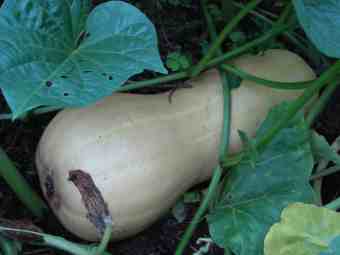
Let them grow in the garden with at least half a dozen spades of humus or let them grow of their own initiative in the compost pile; either way it's a winning situation.
Now you have got one of your nine coloured vegetables and fruit down. The many different varieties of lettuce will easily provide you with all the greens.
Then there are cranberries, cherry guavas and beets for your purples; tomatoes of course for the reds.
One unusual way to preserve these nutrients for year-round use is to brew them into a wine or mead.
 Mulberry mead
Mulberry meadPhytochemical foods
Phytochemical foods are for those who want to sit under the trees they once planted and enjoy watching the grandchildren growing up; and even get to their weddings. Not many of us have that privilege. Organic butternut is a great way to start the journey.
Carotenoids are just part of phytochemical foods that include terpenes, saponins and a heap of other substances increasingly known to be vital for optimal health; indoles are another family
If you are a regular visitor to my healthy living tips page, you'll be getting plenty of all these phytochemical foods. Do not fuss about whether you have enough terpenes in your diet or you will become a health nut like me!
Or start to suffer from a really quite serious malady called health nut neurosis.
Butternut are a good way to start; all you need is a compost heap.
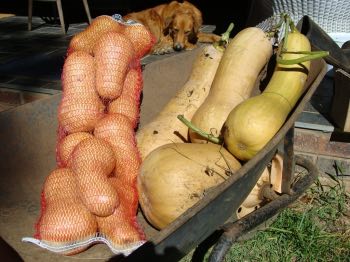
There is no cigar on offer for guessing which of these are organic butternut came from our garden. Fudge, the dog loves them too by the way.
What is meant by organic food?
Organic food is planted without the use of pesticides; and using only natural stuff like humus and vermicompost for fertilizer. It is almost impossible to certify so we try to grow as much of our own food as possible.
- Try our easy butternut squash soup recipe.
- Growing butternut squash isn't rocket science.
- 12 of the best winter squash varieties
- Compost heaps in late winter
When browsing use right click and "Open Link in New Tab" or you may get a bad gateway signal.
Bernard Preston
Bernard Preston is normally pottering in his garden fussing with the worm farms, or the hens, or growing organic butternut but this week it is three new solar-panels. This time, oddly they will be west facing for the afternoon sun. We need more power not at noon, but at around 5pm.
West facing solar panels will not collect maximum sunshine but we are looking for the extra energy for cooking organic butternut in the solar electric oven, for example.
And now it is to the next chapter of my seventh book, Priests Denied. I am about two-thirds of the way. Meantime enjoy Stones in my Clog.
But it is definitely butternut soup for supper tonight.
Did you find this page interesting? How about forwarding it to a friend, or book and food junkie? Better still, a social mead tick would help.
- Bernard Preston homepage
- Yellows
- Organic Butternut
Address:
56 Groenekloof Rd,
Hilton, KZN
South Africa
Website:
https://www.bernard-preston.com